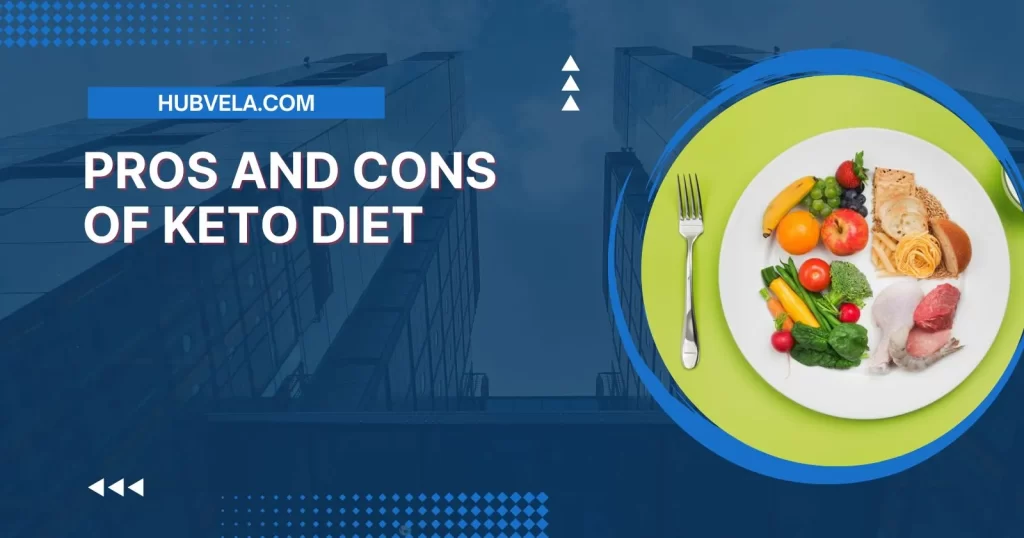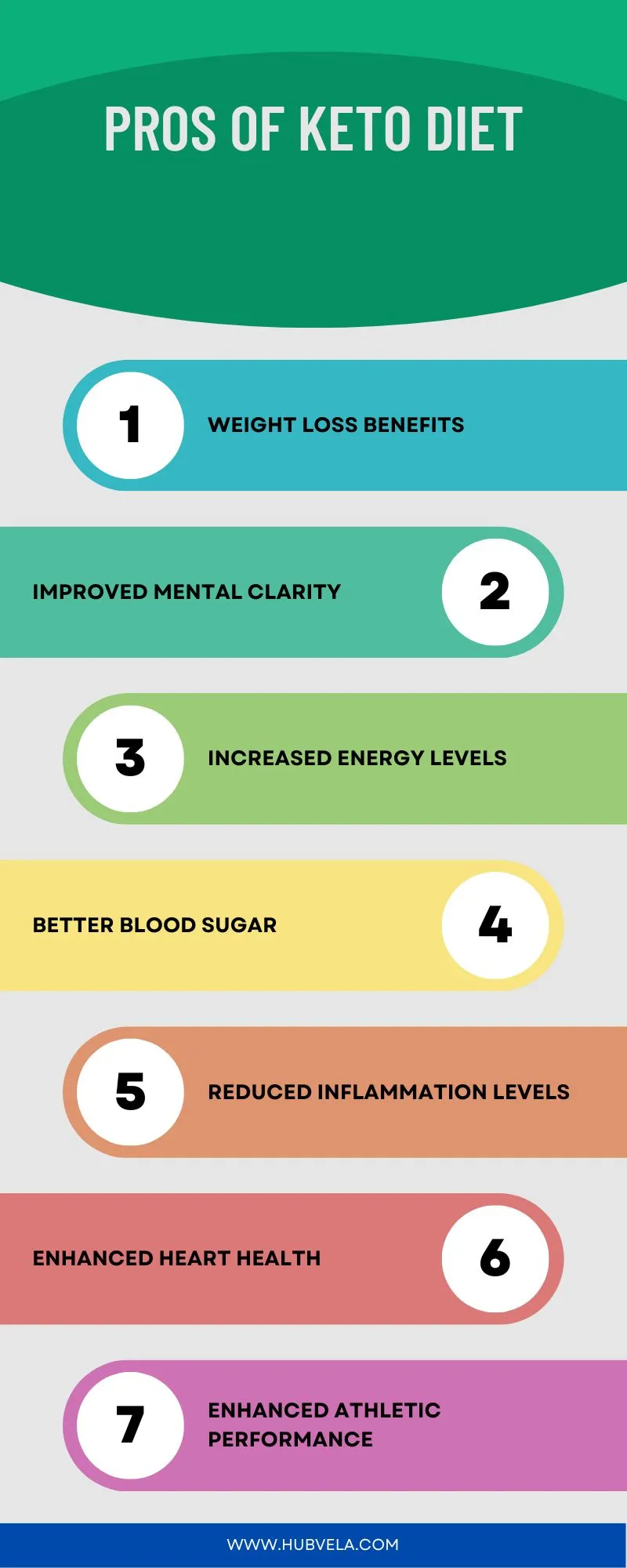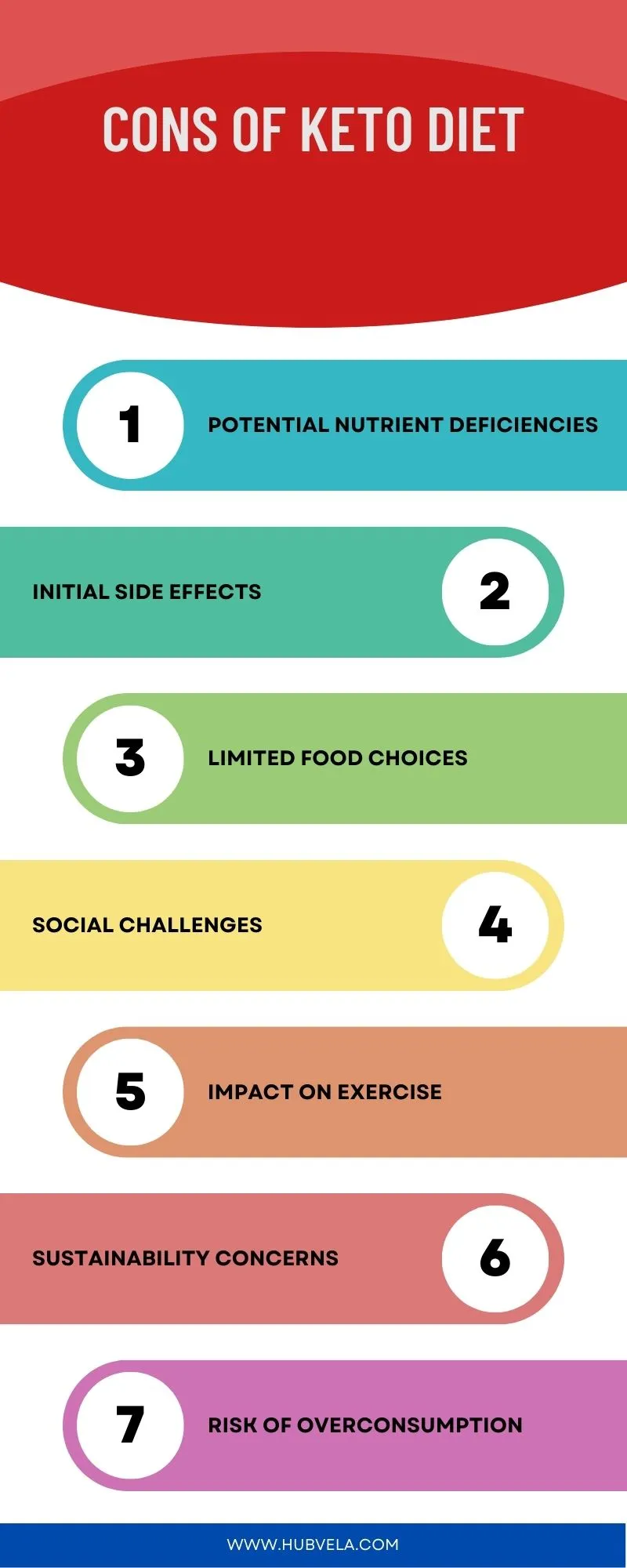The keto diet, also known as the ketogenic diet, is a low-carb, high-fat diet that has gained popularity in recent years. The diet involves drastically reducing carbohydrate intake and replacing it with fat, which puts the body into a metabolic state called ketosis.
While the keto diet has been praised for its potential weight loss benefits and improved blood sugar control, it also has its drawbacks. In this article, we will explore the pros and cons of keto diet.

--Advertisement--
Pros of Keto Diet
The ketogenic diet (keto for short) has gained significant attention in recent years due to its potential health benefits and transformative effects on overall well-being.
This low-carbohydrate, high-fat approach to nutrition offers several compelling advantages that have led many individuals to adopt this lifestyle change. Here are some of the pros of keto diet.

1. Weight Loss Benefits
One of the significant benefits of the Keto diet is its ability to promote weight loss effectively. By drastically reducing your carbohydrate intake and replacing it with healthy fats and proteins, your body enters a state of ketosis.
In this state, your body burns fat for fuel instead of carbohydrates, which can lead to rapid weight loss. The Keto diet helps control insulin levels, which can further aid in weight loss by reducing cravings and regulating blood sugar levels.
Many individuals have experienced substantial weight loss success with this diet, making it a popular choice for those looking to shed excess pounds and improve their overall health.
2. Improved Mental Clarity
The Keto diet not only aids in weight loss but also brings about improved mental clarity is a significant advantage.
By reducing carb intake and relying on fats for fuel, your brain can function more efficiently on ketones, which are produced during the breakdown of fats.
This shift in energy source can lead to enhanced cognitive function, increased focus, and improved concentration levels. Many individuals on the Keto diet report feeling more mentally sharp and alert throughout the day.
Some studies suggest that ketones have neuroprotective benefits, potentially reducing the risk of cognitive decline. So, if you’re looking to not only shed extra pounds but also boost your mental clarity, the Keto diet may be worth considering.
3. Increased Energy Levels
Boost your energy levels naturally by following the Keto diet, which harnesses the power of fats for fuel instead of relying on carbohydrates.
When you switch to a low-carb, high-fat diet, your body enters a state of ketosis, where it burns fat for energy. This metabolic state leads to a more consistent energy supply throughout the day, preventing the energy crashes often associated with high-carb meals.
By utilizing fats as the primary source of fuel, you can experience sustained energy levels, improved focus, and enhanced performance during physical activities.
Many individuals following the Keto diet report feeling more energized, alert, and productive, making it easier to tackle daily tasks and stay active.
4. Better Blood Sugar
By stabilizing blood sugar levels, the Keto diet offers a significant advantage in promoting overall health and well-being. When you consume fewer carbohydrates on a Keto diet, your body shifts from using glucose as its primary energy source to using ketones.
This metabolic state, known as ketosis, can lead to more stable blood sugar levels throughout the day. By minimizing blood sugar spikes and crashes, you may experience improved energy levels, mental clarity, and focus.
Better blood sugar control can be beneficial for individuals with diabetes or insulin resistance. Following a Keto diet can help regulate blood sugar levels and reduce the risk of complications associated with unstable glucose levels, ultimately supporting your overall health.
5. Reduced Inflammation Levels
Stabilizing your blood sugar levels on a Keto diet can also contribute to reducing inflammation throughout your body.
By limiting carb intake and relying on fats for energy, the Keto diet helps lower the production of inflammatory markers in your system. This reduction in inflammation may lead to decreased pain and discomfort in conditions such as arthritis.
The Keto diet encourages the consumption of anti-inflammatory foods like fatty fish, olive oil, and nuts, which can further combat inflammation.
Research suggests that following a Keto diet may help alleviate symptoms of inflammatory diseases and enhance overall well-being by keeping inflammation levels in check.
6. Enhanced Heart Health
Experiencing enhanced heart health is a significant benefit of following a Keto diet. By reducing excessive sugar intake and focusing on healthy fats and proteins, the Keto diet can improve heart health markers such as cholesterol levels and blood pressure.
Studies have shown that this diet can lead to a decrease in triglycerides and an increase in HDL (good) cholesterol, which are both crucial factors in maintaining a healthy heart. The Keto diet has been linked to lower levels of inflammation in the body, which can also benefit heart health.
7. Enhanced Athletic Performance
To optimize your physical performance and endurance, the Keto diet offers potential benefits that can enhance athletic capabilities. By following a Keto diet, you train your body to rely on fat stores for energy instead of carbohydrates.
This metabolic adaptation can lead to improved endurance, especially during long-duration activities like marathons or cycling. The Keto diet has been shown to reduce inflammation in the body, potentially aiding in quicker recovery times after intense workouts.
The diet’s ability to stabilize blood sugar levels can also contribute to sustained energy levels throughout your training sessions.
Cons of Keto Diet
The ketogenic diet, or keto diet, has gained popularity in recent years as a way to lose weight and improve overall health.
However, while there are certainly benefits to this low-carb, high-fat diet, there are also some potential drawbacks to consider. We will explore some of the cons of the keto diet.

1. Potential Nutrient Deficiencies
Nutrient deficiencies may arise when following the keto diet due to the restrictive nature of carbohydrate intake. Since the keto diet severely limits carb consumption, it can lead to inadequate intake of essential nutrients found in carbohydrate-rich foods like fruits, whole grains, and legumes.
Key nutrients that may be lacking include fiber, vitamins C and K, potassium, and magnesium. Fiber is crucial for digestive health, while vitamins and minerals play vital roles in overall well-being.
To combat potential deficiencies, focus on incorporating low-carb, nutrient-dense foods such as leafy greens, nuts, seeds, and avocados. Consider supplementation under the guidance of a healthcare professional to ensure you meet your nutrient requirements while on the keto diet.
2. Initial Side Effects
Experiencing initial side effects is a common concern when starting the keto diet. Your body is adjusting to a significant shift in how it obtains energy, which can lead to what’s commonly known as the ‘keto flu.’
Symptoms may include fatigue, headache, dizziness, nausea, irritability, and constipation as your body transitions into ketosis. This phase is temporary, typically lasting a few days to a week, as your body adapts to using fat for fuel instead of carbohydrates.
Staying hydrated, replenishing electrolytes, and ensuring an adequate intake of vitamins and minerals can help alleviate these side effects.
3. Limited Food Choices
Adjusting to the limited food choices on the keto diet can be a significant challenge for individuals accustomed to a wider range of options in their daily meals.
With keto focusing on high-fat, moderate-protein, and low-carb foods, you may find yourself feeling restricted in your choices.
Say goodbye to many fruits, starchy vegetables, grains, and sugary treats that are typically staples in a regular diet. This means bidding adieu to bananas, potatoes, rice, and cookies.
While this diet can lead to weight loss and improved health markers, the adjustment period can be tough for some. It requires careful planning to ensure you meet your nutritional needs while sticking to the limited keto-approved foods.
4. Social Challenges
Navigating social gatherings and dining out can present significant challenges for individuals following the keto diet. The keto diet’s restriction on carbs can make it tough to find suitable food options when eating out with friends or attending events.
Many social occasions revolve around carb-heavy foods like pasta, bread, and sweets, which may not align with your keto goals. Explaining your dietary choices to others who may not understand or accommodate them can also be uncomfortable.
Feeling pressured to indulge in non-keto-friendly foods to avoid standing out socially adds another layer of difficulty. To overcome these social challenges, consider researching restaurant menus in advance, bringing keto-friendly dishes to potlucks, or politely declining foods that don’t fit your dietary needs.
5. Impact on Exercise
Social challenges can impact your ability to adhere to the keto diet, and now let’s discuss how the diet can affect your exercise routine.
When initially starting the keto diet, you might experience a decrease in energy levels due to the body adjusting to using fat for fuel instead of carbohydrates.
This shift can lead to feelings of fatigue during workouts, making it harder to maintain your usual exercise intensity.
Since carbohydrates are a primary source of quick energy, their restriction on the keto diet can hinder performance in high-intensity activities like sprinting or weightlifting.
It may take some time for your body to adapt to utilizing fat efficiently during exercise, potentially affecting your overall workout performance while on the keto diet.
6. Sustainability Concerns
Sustaining the keto diet long-term can pose challenges due to its restrictive nature and potential impact on various aspects of your lifestyle. The limited food choices, particularly the strict limitations on carbohydrates, can make it difficult to adhere to the diet over time.
This restriction may lead to feelings of deprivation and make social situations challenging. The long-term effects of continuously being in a state of ketosis aren’t yet fully understood.
As a result, some individuals may find it hard to maintain the diet due to concerns about its impact on their overall health. It’s essential to consider whether the keto diet aligns with your long-term health and lifestyle goals before committing to it for an extended period.
7. Risk of Overconsumption
When following the keto diet, it’s crucial to be mindful of the risk of overconsumption to prevent potential health complications. Since high-fat foods like cheese, nuts, and oils are staples in the keto diet, it’s easy to exceed your caloric needs without realizing it.
Overeating these foods can lead to weight gain, digestive issues, and an increase in cholesterol levels. Consuming excess protein, which is common in a keto diet, can strain your kidneys over time.
To avoid these risks, focus on portion control, include a variety of nutrient-dense foods, and listen to your body’s hunger cues. Being aware of your intake is essential for maintaining a healthy balance while on the keto diet.
Conclusion on Pros and Cons of Keto Diet
Overall, the keto diet has benefits like weight loss and improved blood sugar levels. However, it also has drawbacks such as potential nutrient deficiencies and difficulty sticking to the restrictive eating plan.
It’s important to weigh the pros and cons before starting this diet to ensure it aligns with your health goals and lifestyle.
Remember, what works for one person may not work for another, so always consult with a healthcare professional before making any drastic dietary changes.


